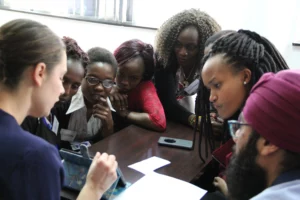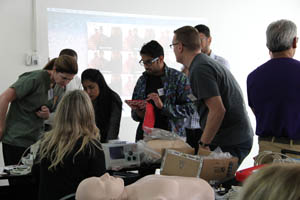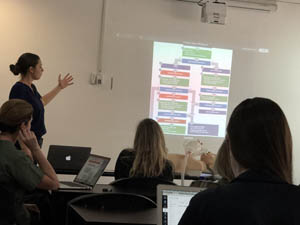When ‘User Experience’ is a Matter of Life and Death
 User experience. It’s an important term for anyone developing and working with computers or digital apps. Sometimes called UX, this ‘techie term’ also became (literally) a matter of life and death for the Disque Foundation (more on that a little later).
User experience. It’s an important term for anyone developing and working with computers or digital apps. Sometimes called UX, this ‘techie term’ also became (literally) a matter of life and death for the Disque Foundation (more on that a little later).
User experience is exactly what it says – a user’s experience when they are looking at or using anything in the digital realm whether that’s a website, app or any form of online communication like email or Snapchat. User experience is particularly key to any digital product’s success because if someone can’t figure out how an app works they aren’t going to use it, or worse, they’ll use it incorrectly.
Saving Time and Lives
The Disque Foundation’s Save a Life Initiative got an interesting window into the specifics of user experience testing when it partnered with National Health Care Provider Solutions to launch a life-saving app in 2013. Called Medicode, it’s at the heart of what Disque Foundation does and our mission. Medicode puts all of the American Heart Association’s best practices for how exactly to deal with an emergency situation into the palm of your hand, and that means a chance to save the life of someone experiencing cardiac arrest or a host of other emergencies. Prior to the app’s introduction, emergency workers often had to flip through a set of physical, expandable cards for guidance and that wasted valuable time. Because it saves time, Medicode saves lives.
How MediCode Saves Lives
 Introducing an app is one thing, getting the user experience just right is another, and in this case, feedback was critically important. For all those reasons, the Disque Foundation brought Medicode to Nairobi, Kenya this past July to better understand how doctors and nurses there would interact with the app in their home environments and to get their input. It was user experience ‘by fire’. Over the course of three days of intense training, our team worked with ten doctors and nurses instructing on how Medicode could help them treat patients. The course was so successful that this newly trained group is now what we call ‘super-users’, meaning they are qualified and ready to teach other members of their healthcare communities. These newly-trained super-users are already teaching other doctors and nurses across Kenya how to use this life-saving app.
Introducing an app is one thing, getting the user experience just right is another, and in this case, feedback was critically important. For all those reasons, the Disque Foundation brought Medicode to Nairobi, Kenya this past July to better understand how doctors and nurses there would interact with the app in their home environments and to get their input. It was user experience ‘by fire’. Over the course of three days of intense training, our team worked with ten doctors and nurses instructing on how Medicode could help them treat patients. The course was so successful that this newly trained group is now what we call ‘super-users’, meaning they are qualified and ready to teach other members of their healthcare communities. These newly-trained super-users are already teaching other doctors and nurses across Kenya how to use this life-saving app.
“Not only could we explain one-on-one the app’s best practices, but we were able to immediately make functionality changes. So next time, when we’re not in the room, the learner will instinctively know what to do next.”
A second key part of Disque Foundation’s Nairobi user experience testing was gathering vital feedback on how the app actually worked in the field and, even more importantly, how it could be improved. Time is always the most critical element in any emergency, and working with our African colleagues in realistic training situations meant we were able to witness where they got held up or confused and we could then adjust the algorithms accordingly.
“Not only could we explain one-on-one the app’s best practices, but we were able to immediately make functionality changes. So next time, when we’re not in the room, the learner will instinctively know what to do next,” says Disque Leadership Team member, Mackenzie Thompson.
Additional feedback indicated a timer should be added, putting that much more pressure on the app user to make quick and decisive decisions. Thanks to this invaluable feedback, that could only be gathered in the field, Medicode now even more effectively replicates scenarios that doctors and nurses will likely encounter in their Nairobi hospitals.
Lasting Effects of MediCode
 Dr. Sheila Muchiri, a Nairobi-based physician who took part in the Medicode training told us that she used it to bring about change at her hospital where she is currently co-chairing its first-ever resuscitation committee, “I designed a questionnaire to establish the knowledge, attitudes and practices on resuscitation at the hospital. I also helped conduct an audit of necessary equipment and drugs required on a resuscitation trolley to better equip the hospital with these supplies.” Dr. Muchiri didn’t stop there, she is currently developing a schedule for hospital-wide training in these new Medicode practices. This is exactly what we mean when we say Disque Foundations User Experience testing was nothing less than a matter of life and death. And, what we heard from Dr. Vincent Othigo, another one of our trainees-turned-super-users, is ultimately what guides the Disque Foundation’s work, “What sticks with me is an appreciation for teamwork, you can’t be a one-person rescuer…another big takeaway is the confidence it gave me in facing emergency situations.”
Dr. Sheila Muchiri, a Nairobi-based physician who took part in the Medicode training told us that she used it to bring about change at her hospital where she is currently co-chairing its first-ever resuscitation committee, “I designed a questionnaire to establish the knowledge, attitudes and practices on resuscitation at the hospital. I also helped conduct an audit of necessary equipment and drugs required on a resuscitation trolley to better equip the hospital with these supplies.” Dr. Muchiri didn’t stop there, she is currently developing a schedule for hospital-wide training in these new Medicode practices. This is exactly what we mean when we say Disque Foundations User Experience testing was nothing less than a matter of life and death. And, what we heard from Dr. Vincent Othigo, another one of our trainees-turned-super-users, is ultimately what guides the Disque Foundation’s work, “What sticks with me is an appreciation for teamwork, you can’t be a one-person rescuer…another big takeaway is the confidence it gave me in facing emergency situations.”
Medicine is sometimes called a Universal Language and we saw that firsthand in Nairobi. Medicode and the Disque Foundation’s mission to make the most of this powerful new tool brought together different practitioners from different places and with different specialties but we all had one powerful thing in common: A desire to make a difference.
